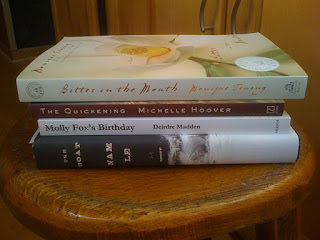Finished
Fiction: Sweetness at the Bottom of the Pie (Alan Bradley) and The Red Pyramid (Rick Riordan)
Nonfiction: Kingdom by the Sea (Paul Theroux), Lost on Planet China (J. Maarten Troost), My Love Affair with England (Susan Allen Toth)
Purchased
The Boat (Nam Le), Yarn (Kyoko Mori), Busman’s Honeymoon (Dorothy L. Sayers), Hound of the Baskervilles (Arthur Conan Doyle), 84, Charing Cross (Helene Hanff), Eating Air (Pauline Melville), Burning Land (Bernard Cornwell)
June was a “gift” reading month in which I felt like I made up for time lost to textbooks over the past academic year. Studying was worthwhile, to be sure, but I missed my pleasure reading.
Sweetness at the Bottom of the Pie
One of the first books I dove into was Alan Bradley’s Sweetness at the Bottom of the Pie, which my friend Sarah pressed upon me. I know this is a popular book and has a precocious protagonist, both of which made me leery initially. But once I started Sweetness, I was immediately charmed by the main character’s voice, as well as the author’s style.
Life for eleven-year-old Flavia de Luce is starting to get interesting. First she finds a dead bird, with a postage stamp stuck to its beak, on her front doorstep. Then she stumbles upon the body of a man about to take his final breath. When Flavia’s father becomes the prime suspect, she takes on the task on solving the mystery and is often a few steps ahead of the police.
If you like traditional, locked room mysteries or interesting characters, then I highly recommend this book. Flavia is a budding chemist with two annoying older sisters, all of whom are left to raise themselves after their mother’s death. Her family lives in a decaying English manor house, which lends its own character. Sweetness at the Bottom of the Pie had similar charms to those I found in Alan Bennett’s Uncommon Reader and Alexander McCall Smith’s Isabel Dalhousie mysteries. I am looking forward to reading The Weed That Strings the Hangman’s Bag.
Kingdom by the Sea
Just in time for my first return to England since 1988, I read Kingdom by the Sea.
Initially I thought Theroux was a horrible snob, not at all open to the spirit of the place. He painted every seaside town on the southern coast of England as a hellhole. Initially, I thought, maybe they are, but having paid a recent visit I realize Theroux was unnecessarily harsh or dismissive, even though the year was 1982 and England wasn’t in a good place economically. Most of England was depressed. Unemployment rates were high. Even though British Rail was on strike, it had long since stopped running to many of the places Theroux would visit. Northern Ireland was thick in the Troubles. Scotland was imbued with irrepressible rugged beauty. The eastern coast of England was fading into the sea.
Many times through the course of the book, I found Theroux dispirited, lacking the excitement of discovery, and it often felt as if he was fulfilling a publishing contract. Susan Allen Toth even alludes to this crankiness in her memoir, My Love Affair with England. In the end, Theroux creates lasting memories of the coast and a particular time in British history. Quite frankly, I found Lyme Regis rather agreeable, neither run down nor overly touristy, while catering clearly to a summer crowd.
The Red Pyramid
Also this month I read aloud The Red Pyramid to the boys. This book is the first in Rick Riordan's newest series, which chronicles siblings Sadie and Carter Kane's adventures in the world of Egyptian mythology. The book sucked. Yes, I know it's a middle reader book. Even so, I think it's a travesty that Riordan was able to write a sloppy story for page count. The story is marred by too many side adventures. As in Riordan's Percy Jackson series, I enjoyed the mythology. The boys' recent visit to the British Museum was even more rich for knowing about the Rosetta Stone and assorted Egyptian gods (the baboon Thoth, for example) and accoutrement (such as shabti, or clay figurines). Still, I expect a lot more from book two. Better, I would like the boys to read these books on their own and report back to me.










